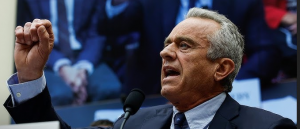President-elect Donald Trump’s nomination of Robert F. Kennedy Jr. to lead the Department of Health and Human Services (HHS) has attracted significant attention and ignited controversy, especially as Kennedy prepares for meetings with senators this week. The well-known environmental lawyer and outspoken vaccine skeptic is expected to face intense scrutiny during his four-day session with lawmakers.
Robert F. Kennedy Jr.'s Controversial HHS Nomination Raises Eyebrows

Robert F. Kennedy Jr.'s Controversial HHS Nomination Raises Eyebrows
Robert F. Kennedy Jr.'s appointment as the Secretary of HHS has ignited debates on public health and environmental issues.
Kennedy will speak with Senator Bill Cassidy (R-LA), the incoming chair of the Senate Health, Education, Labor, and Pensions (HELP) Committee, among other discussions. Meetings with Republican staff members of the HELP panel this Thursday will be pivotal in the confirmation process. His controversial opinions on vaccines, which include endorsing discredited claims linking vaccines to autism, have raised concerns among health experts, who regard his stances as alarming.
Moreover, Kennedy has recently reaffirmed his initiative to remove fluoride from the public water supply, stating via social media, “On January 20, the Trump White House will advise all U.S. water systems to remove fluoride from public water.” This announcement has triggered backlash from medical professionals who advocate the benefits of fluoridation for preventing tooth decay.
His record of challenging established health policies raises questions for his potential confirmation. Critics warn that the removal of fluoride could have dire effects, particularly in underserved communities where dental care is scarce. However, some of Kennedy’s supporters contend that his penchant for questioning prevailing norms is what makes him a strong candidate for the HHS position. They cite his extensive career in environmental law, wherein he has fought to hold corporations accountable for environmental degradation.
As Kennedy engages with lawmakers this week, the outcomes of his discussions will be critical in determining his confirmation. The hearings are expected to scrutinize not only his controversial proposals but also his ability to align with both Trump’s administration and Senate Republicans, potentially setting the tone for his leadership at HHS.
Moreover, Kennedy has recently reaffirmed his initiative to remove fluoride from the public water supply, stating via social media, “On January 20, the Trump White House will advise all U.S. water systems to remove fluoride from public water.” This announcement has triggered backlash from medical professionals who advocate the benefits of fluoridation for preventing tooth decay.
His record of challenging established health policies raises questions for his potential confirmation. Critics warn that the removal of fluoride could have dire effects, particularly in underserved communities where dental care is scarce. However, some of Kennedy’s supporters contend that his penchant for questioning prevailing norms is what makes him a strong candidate for the HHS position. They cite his extensive career in environmental law, wherein he has fought to hold corporations accountable for environmental degradation.
As Kennedy engages with lawmakers this week, the outcomes of his discussions will be critical in determining his confirmation. The hearings are expected to scrutinize not only his controversial proposals but also his ability to align with both Trump’s administration and Senate Republicans, potentially setting the tone for his leadership at HHS.





















